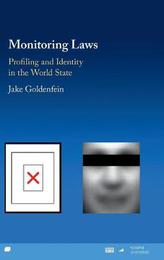
|
Monitoring Laws: Profiling and Identity in the World State
Hardback
Main Details
| Title |
Monitoring Laws: Profiling and Identity in the World State
|
| Authors and Contributors |
By (author) Jake Goldenfein
|
| Physical Properties |
| Format:Hardback | | Pages:250 | | Dimensions(mm): Height 230,Width 155 |
|
| Category/Genre | Computer security |
|---|
| ISBN/Barcode |
9781108426626
|
| Classifications | Dewey:345.052 |
|---|
| Audience | | Professional & Vocational | |
|---|
| Illustrations |
Worked examples or Exercises
|
|
Publishing Details |
| Publisher |
Cambridge University Press
|
| Imprint |
Cambridge University Press
|
| Publication Date |
24 October 2019 |
| Publication Country |
United Kingdom
|
Description
Our world and the people within it are increasingly interpreted and classified by automated systems. At the same time, automated classifications influence what happens in the physical world. These entanglements change what it means to interact with governance, and shift what elements of our identity are knowable and meaningful. In this cyber-physical world, or 'world state', what is the role for law? Specifically, how should law address the claim that computational systems know us better than we know ourselves? Monitoring Laws traces the history of government profiling from the invention of photography through to emerging applications of computer vision for personality and behavioral analysis. It asks what dimensions of profiling have provoked legal intervention in the past, and what is different about contemporary profiling that requires updating our legal tools. This work should be read by anyone interested in how computation is changing society and governance, and what it is about people that law should protect in a computational world.
Author Biography
Jake Goldenfein is a Postdoctoral researcher at the Digital Life Initiative at Cornell University, New York, and a lecturer at Swinburne Law School. A law and technology scholar exploring governance in computational society, Goldenfein has published across disciplines, with work appearing in Law and Critique, the Columbia Journal of Law and Arts, the Internet Policy Review, and the University of New South Wales Law Journal.
Reviews'Jake Goldenfein's brilliant and theoretically sophisticated reconstruction of legal identity in the era of automated profiling serves notice to our would-be digital overlords: the days when they could imagine that legal and policy frameworks were too hopelessly outdated to keep up are over. Monitoring Laws is a crucial contribution to contemporary discussions of privacy and profiling that provides the conceptual and historical resources for developing a regulatory regime that protects personal identity and legal rights in an era of ubiquitous monitoring.' Mark Andrejevic, Monash University 'How thrilling it is to read a work that stretches ideas of what legal thought and practice have been, and what they might yet become. Monitoring Laws is such a book. In captivating, pellucid prose, Jake Goldenfein retells the story of two centuries of profiling practice - from photography to neural nets, from dossiers to data analytics - and the legal, representational and relational thinking imbricated therein. Throughout, Goldenfein shows, legal notions of identity have been modulated, challenged and reworked along with developments in surveillance technology. And those notions may yet still be, he shows, by thinking juridically with data, rather than through, against, or in spite of our contemporary informational existence. To the broad range of readers likely to find this book of interest, Goldenfein urges paying close attention to how the world and we who live here are being structured and actioned informationally, and extending our thinking about legal subjects accordingly. And once one does attend to this book's thoughtful refiguring of the stakes of digital surveillance, it is indeed hard to look away.' Fleur Johns, University of New South Wales, Sydney 'You are being observed, monitored and profiled in more areas of life than you know. In this brilliant book, Jake Goldenfein explains the history and theory of the laws of monitoring, and provides a roadmap to the future. If you want to understand how we got to this point, and what's at stake in a panoptical society, then you need to read this book.' Dan Hunter, Executive Dean, Queensland University of Technology
|